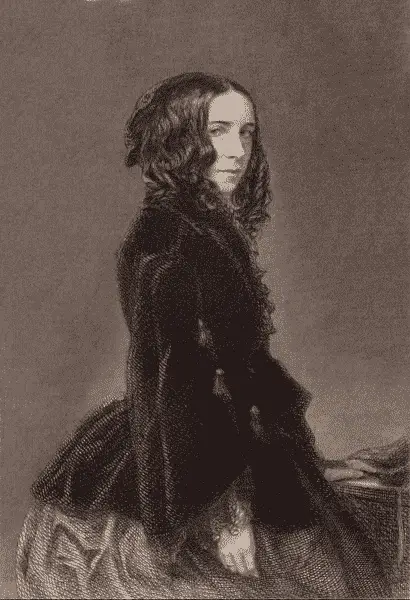
FULL POEM - SCROLL DOWN FOR LINE-BY-LINE ANALYSIS
I think of thee!—my thoughts do twine and bud
About thee, as wild vines, about a tree,
Put out broad leaves, and soon there ‘s nought to see
Except the straggling green which hides the wood.
Yet, O my palm-tree, be it understood
I will not have my thoughts instead of thee
Who art dearer, better! Rather, instantly
Renew thy presence; as a strong tree should,
Rustle thy boughs and set thy trunk all bare,
And let these bands of greenery which insphere thee
Drop heavily down,—burst, shattered, everywhere!
Because, in this deep joy to see and hear thee
And breathe within thy shadow a new air,
I do not think of thee—I am too near thee.

LINE-BY-LINE ANALYSIS
STANZA 1
I think of thee!—my thoughts do twine and bud
About thee, as wild vines, about a tree,
The poem begins purposefully, with the speaker directly addressing (the use of which creates a heartfelt and personal tone) her lover (if taken to be autobiographical, this would be Robert Barrett Browning, famous poet and husband to Elizabeth) and immediately declaring how much he occupies her thoughts. Barrett Browning’s natural imagery of the ‘wild vines’ that ‘twine and bud’ ‘about a tree’ signify how natural loving him is for her, as though it is second-nature, as well as how it constantly evolves to become even deeper, just like new flowers sprout from the bud of a vine. Additionally, the way in which the ‘wild vines’ intertwine ‘about a tree’ is a metaphor for the couple’s intimacy – both physically and emotionally.
Put out broad leaves, and soon there ‘s nought to see
Except the straggling green which hides the wood.
However, the vines that represent her thoughts keep evolving to the point where the ‘broad leaves’ that they produce completely engulfs the tree that represents her lover, concealing it from view. Metaphorically, this means that her thoughts for him have grown so strong that they overwhelm and conceal his identity so that she cannot see past them and see him for who he really is, not who he is in her thoughts.
Yet, O my palm-tree, be it understood
I will not have my thoughts instead of thee
Who art dearer, better! Rather, instantly
The speaker’s reference to her lover as her ‘palm-tree’ is significant due to the palm branch’s symbolism of victory and triumph in Christianity. This originates from Jesus’ Triumphal Entry on Palm Sunday when palm branches were placed in his path. Hence, this metaphor is used by the speaker to describe the greatness of her lover and her feeling of triumph having found him. She goes on to vow that she won’t let these growing thoughts about her lover overwhelm and replace the real version of him – the latter being ‘dearer’ and ‘better’.
Renew thy presence; as a strong tree should,
Rustle thy boughs and set thy trunk all bare,
Continuing with the tree metaphor, the speaker uses the imperatives ‘renew’ and ‘rustle’ to urge her lover to take action and renew his presence in her life to enable her to replace the thoughts she has of him with real-time spent in his company – in turn reacquainting her with his actual being (interpreted from the metaphor, ‘rustle thy boughs and set thy trunk all bare’).
And let these bands of greenery which insphere thee
Drop heavily down,—burst, shattered, everywhere!
These ‘bands of greenery’ are the vines, representing her thoughts engulfing her lover who is represented by the tree. The extent to which they now conceal his actual being is emphasised by the word ‘insphere’. Her thoughts are every evolving, from just intertwining with the tree previously to now enveloping him from all angles. The triplet ‘burst, shattered, everywhere’ and the caesura (exclamation mark) conveys her eagerness for these thoughts to be replaced by his physical presence.
Because, in this deep joy to see and hear thee
And breathe within thy shadow a new air,
I do not think of thee—I am too near thee.
The conclusion to the poem offers a satisfying resolution, with the speaker’s longing to rid her mind of these thoughts being answered as she finally comes face-to-face with her lover, experiencing ‘deep joy to see and hear [him]’. She is revitalised in his presence, breathing ‘a new air’ – a metaphor for her relief for experiencing his actual company and not her interpretation of it. The statement ‘I do not think of thee’ is the opposite of the opening statement of the poem – illustrating how the speaker’s character has progressed in parallel with the cyclical narrative of the poem.


